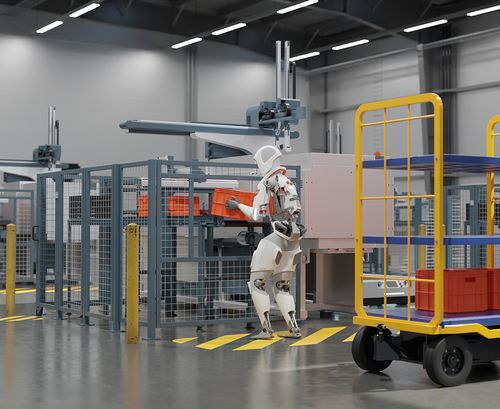Apptronik and Mercedes-Benz Enter Commercial Agreement That Will Pilot Apptronik's Apollo Humanoid Robot in Mercedes-Benz Manufacturing Facilities

Apptronik, a leader in next-generation general purpose humanoid robots designed to change the way we live and work, today announced that it has entered into an agreement with Mercedes-Benz. As part of the agreement Apptronik and Mercedes-Benz will collaborate on identifying applications for highly advanced robotics in Mercedes-Benz Manufacturing.
Mercedes-Benz is committed to empowering its staff with state-of-the-art technology that supports its commitment to excellence, and with Apollo, Mercedes-Benz brings one of the world's most advanced commercial humanoid robots into its manufacturing facilities. Mercedes-Benz is exploring potential use cases for Apollo humanoid robots in logistics to bring parts to the production line for workers to assemble, the so-called delivery of assembly kits, while simultaneously inspecting the components. Apollo will also be used to deliver the totes of kitted parts later in the manufacturing process.
The addition of humanoid robots to factories and plants would allow organizations like Mercedes-Benz to deploy robotics that are optimized to perform in spaces that are designed for humans, thus avoiding full-scale facility redesigns that are built around robots rather than people. In short, this approach centers on automating some physically demanding, repetitive and dull tasks for which it is increasingly hard to find reliable workers.
"When we set out to build Apollo, an agreement like the one we're announcing today with Mercedes-Benz was a dream scenario," said Jeff Cardenas, co-founder & CEO of Apollo. "Mercedes plans to use robotics and Apollo for automating some low skill, physically challenging, manual labor – a model use case which we'll see other organizations replicate in the months and years to come."
Apollo, which has a form factor that roughly matches the size of a human worker (5 foot 8 inches tall and 160 pounds in weight with the ability to lift 55 pounds), is built to operate in industrial spaces alongside people. Combined with a unique force control architecture that maintains safe operation around people (similar to a collaborative robot versus a traditional industrial robot), Apollo's friendly design allows it to work alongside people while simultaneously taking on the physically demanding tasks.
Additionally, Apollo's computing power makes it possible for leading AI companies to solve use cases outside the ones that Apptronik will initially solve, similar to the iPhone concept: world-class, user-friendly hardware that comes with some pre-built applications and can add applications developed by third parties.
"To build the most desirable cars we continually evolve the future of automotive production: Advancements in robotics and AI open up new opportunities also for us. We are exploring new possibilities with the use of robotics to support our skilled workforce in manufacturing. This is a new frontier and we want to understand the potential both for robotics and automotive manufacturing to fill labor gaps in areas such as low skill, repetitive and physically demanding work and to free up our highly skilled team members on the line to build the world's most desirable cars," said Jörg Burzer, Member of the Board of Management of Mercedes-Benz Group AG, Production, Quality & Supply Chain Management.
About Apptronik
Apptronik is the leader in next-generation general purpose robots designed to change the way we live and work. Apollo, a humanoid robot built to work alongside people in environments designed for people, culminated from the design and development of over 10 general purpose robots including extensive work on NASA Valkyrie. The company was founded in 2016 out of the Human Centered Robotics Lab at the University of Texas at Austin, with a mission to leverage innovative technology for the betterment of society. Apptronik's goal is to introduce the next generation of robots that will change the way people live and work, while tackling some of our world's largest challenges. To learn more about Apptronik, please visit https://apptronik.com.
Comments (0)
This post does not have any comments. Be the first to leave a comment below.
Featured Product

